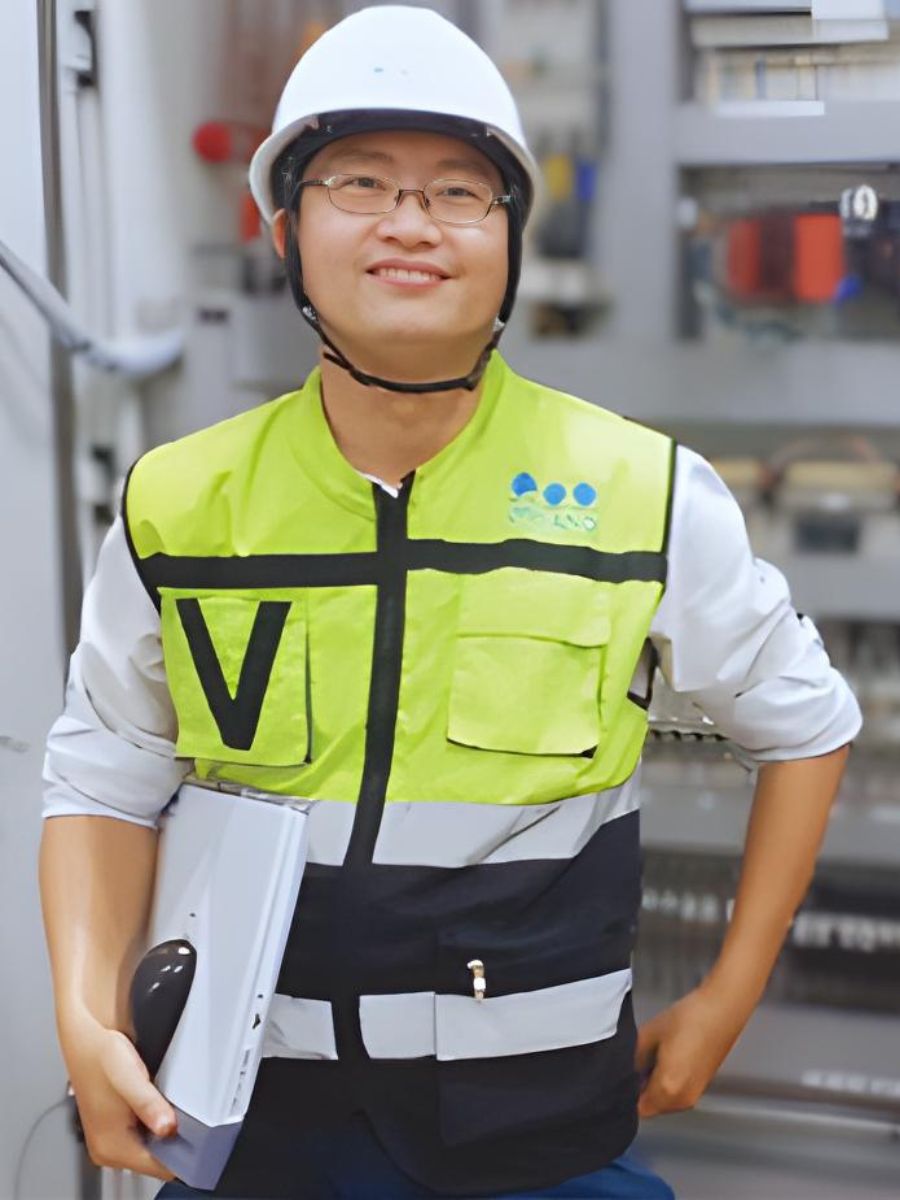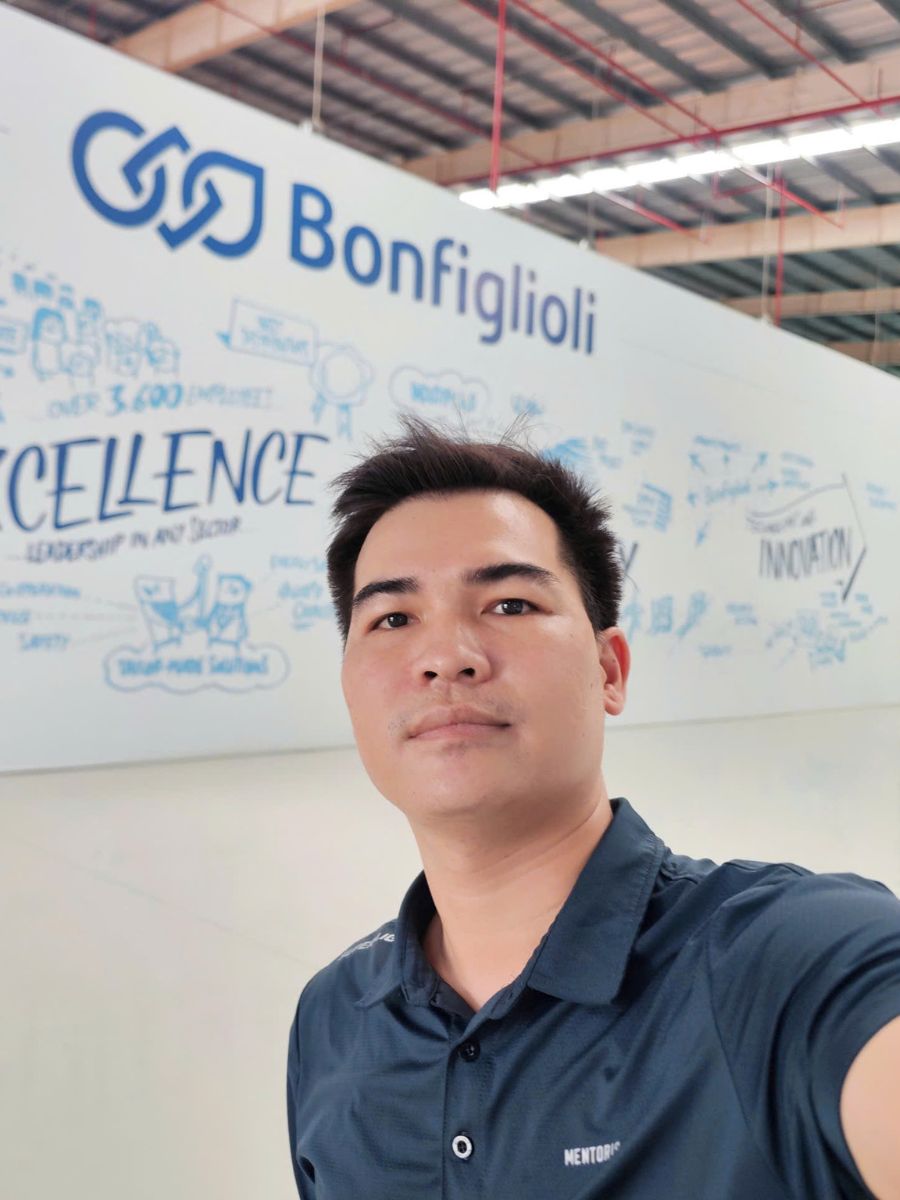Program
Mechatronics Engineering
Length of time
4 years
Program code
7520114
Tuition fees
VND 27.000.000/năm*
Minimum required accumulated credits
188 credits
(quarter system – 3 semesters/year)
INTRODUCTION
4 năm
188 credits (quarter system – 3 semesters/year)
VND 27.000.000/year*
*Tuition fees are guaranteed not to increase for four years from the date of enrollment
The Mechatronics Engineering program is an integrated and interdisciplinary field, providing knowledge blocks in mechanical engineering, electrical – electronic engineering, and programming engineering. Students in this major combine these knowledge areas to design, manufacture, and operate intelligent machines and equipment such as robots and integrated–flexible manufacturing systems.
The Bachelor’s program in Mechatronics Engineering at EIU is designed with a balance between theory and practice. It aims to provide human resources with the mindset and skills in machine design, control systems, technical programming, and system integration to meet the needs of modern manufacturing. Students gain exposure and practical experience through internships and training at enterprises. In addition, Mechatronics Engineering students also develop an understanding of social and humanities issues related to business, environment, government, history, language, culture, and international relations.
Training orientations of the specializations within Mechatronics Engineering include:
Robotics Engineering: provides in-depth knowledge in modeling, calculation, design, manufacturing, and control of robots and autonomous systems. Students can directly participate in the processes of designing, manufacturing, and controlling robots such as industrial robots and autonomous robots or devices.
Integrated Systems: provides in-depth knowledge in designing and integrating systems based on Industry 4.0 technologies such as robotic systems, MES, digitized devices, and integrated systems. Students can work and directly contribute to the innovation process of manufacturing enterprises.
About the School of Engineering

Offering majors in Electrical Engineering, Mechatronics Engineering, Automation and Control Engineering, Electronics and Telecommunications Engineering, and Mechanical Engineering, the Faculty of Engineering focuses on enhancing learners’ capabilities and creating added value through highly integrated and continuously updated training programs.
PROGRAM HIGHTLIGHTS
The Mechatronics Engineering program has been accredited at the program level in accordance with the regulations of the Ministry of Education and Training and is periodically updated in a modern direction, based on the standardized frameworks of ABET-accredited programs.
The curriculum provides a solid foundation in natural sciences and mathematics through general education courses. Core disciplinary knowledge is broad, covering areas such as mechanical design and manufacturing, electrical and electronic engineering, microcontrollers, control systems, and technical programming. Specialized knowledge is sufficiently in-depth in two orientations: Robotics Engineering and Integrated Systems.
The program is designed with a balanced combination of theory and practice, with a strong focus on developing students’ engineering design thinking and problem-solving skills.
Active teaching methods are applied, such as problem-based learning (PBL) and project-based learning (PjBL), complemented with supplementary knowledge to help students develop logical thinking, teamwork skills, problem-solving abilities, report writing, presentation, management, and self-learning skills—ensuring adaptability to corporate working environments.
Students have the opportunity to practice and experiment with state-of-the-art equipment at the Industry 4.0 Innovation Center and the Advanced Manufacturing Center with the latest technologies. They directly participate in robot design and control, as well as address real-world challenges through projects in equipment digitization, IoT, smart factories, and smart warehouses in industrial production.
Graduates are required to achieve a minimum English proficiency of IELTS 6.0, providing a strong foundation for competitiveness and effective communication in international environments.
All teaching and learning materials are entirely in English.
Students also engage in scientific research alongside faculty through projects in collaboration with enterprises, solving real-world industrial problems—helping them consolidate knowledge and enhance professional skills.
After graduation, students are well-prepared to pursue postgraduate studies at prestigious universities both domestically and internationally.
Moreover, students have opportunities to participate in experiential learning activities in countries with advanced industrial technologies such as the USA, Japan, South Korea, and Singapore.
Program learning outcomes
Upon completion of the program, students will achieve the following Program Learning Outcomes (PLOs):
PLO 1. Apply knowledge of political theory, social sciences, and law to professional and daily life; apply knowledge of national defense and security to foster patriotism; demonstrate self-discipline in physical training to improve personal health.
PLO 2. Apply knowledge of mathematics and natural sciences to describe, calculate, and simulate processes, components, and systems in the field of Electrical and Electronics–Telecommunications Engineering.
PLO 3. Identify, define, and model problems in Electronics and Telecommunications Engineering; analyze and evaluate corresponding processes, components, and systems.
PLO 4. Design and evaluate components, systems, and engineering solutions in Electronics and Telecommunications Engineering to meet desired technical specifications as well as economic, environmental, public health, safety, and social welfare constraints.
PLO 5. Employ general skills (communication, foreign language proficiency, teamwork, and project management) to work effectively in multidisciplinary teams and international environments.
PLO 6. Demonstrate proficient practical skills to adapt effectively to specialized tasks in Electronics and Telecommunications Engineering, within the context of technological advancement.
PLO 7. Investigate and research complex issues in Electronics and Telecommunications Engineering systematically, including literature review, experiment design and execution, data analysis and interpretation, to describe electrical–electronic processes and synthesize information for valid conclusions.
PLO 8. Demonstrate integrity, professional ethics, and social responsibility in engineering-related contexts.
PLO 9. Recognize the need for and demonstrate readiness for lifelong learning; pursue self-study and independent research in new knowledge areas across the broad field of Electronics and Telecommunications.
Foreign Language Requirement: To graduate, students in the Electronics and Telecommunications Engineering program must achieve a minimum English proficiency equivalent to IELTS 6.0.
Study Environment
Job Opportunities
With the advantage of meeting the English proficiency requirement of IELTS 6.0, graduates of the Mechatronics Engineering program are well-qualified to take on positions such as engineers or mechatronics specialists in factories, enterprises, academies, research centers, and educational institutions. They may also pursue graduate studies (Master’s or Doctoral degrees) in Vietnam or abroad, or start their own businesses in the field of mechatronics.
Graduates of the Mechatronics Engineering program have opportunities to work in foreign companies and multinational corporations such as Techtronics Industry (TTI), Baosteel Packaging Vietnam, II-VI Vietnam Co., Ltd. (Coherent), Hoya Lens Vietnam, Tetra Pak, Intel Vietnam, Ashley Furniture Vietnam, DP SYSTEM Electronic Mechatronic Co., Ltd., Therm-X SVT, Lego Vietnam, Vestas Wind Technology Vietnam Co., Ltd., and many others. They may also advance their studies abroad (Master’s or Doctoral programs), work at research institutions, or continue to develop their expertise and launch startups.
Typical job positions for graduates include:
- Robotics Engineer: Designing, manufacturing, and controlling robots and autonomous devices.
- System Integration Engineer: Designing, manufacturing, operating, and maintaining integrated systems and production lines.
- Project Manager in fields related to Mechanical Engineering, Automation, and Control Programming.
- Technical Sales Engineer.
- Project Engineer.
- Technical Solutions Consultant.
- Production Manager or Entrepreneur.
- Researcher at research institutes and educational institutions.
Alumni sharing

Nguyen Quang Luc
CSV khóa: 1
Khoa: School of Engineering
Công việc hiện tại: E&IC Engineer at Organo Việt Nam
“With the knowledge and skills I gained from EIU, I feel very confident at work, and this has been clearly reflected in my current job. It took me very little time to adapt and integrate into the working environment. The experience and English proficiency I acquired have also supported me greatly in developing my career.”

Nguyen Anh Duy
CSV khóa: 1
Khoa: School of Engineering
Công việc hiện tại: Technician Supervisor at Intel Products Vietnam - SHTP HCM
“The School of Engineering is well-equipped with modern facilities, and the practice-oriented curriculum allows students to gain substantial knowledge and skills before graduation. The lecturers are enthusiastic and highly knowledgeable in their fields. Both the faculty and the university genuinely care for and support their students. The program’s practical approach provides a solid foundation that helps graduates quickly adapt and grow in the real working environment.”

Nguyen Thanh Hiep
CSV khóa: 5
Khoa: School of Engineering
Công việc hiện tại: Manufacturing Engineer at Parker Meggitt Vietnam Company
“Studying at EIU was definitely the right decision for me. What convinced me most were the modern facilities, machinery, and equipment dedicated to engineering. The learning environment at EIU gave me the opportunity to experience real working conditions through site visits and long-term internships at major engineering companies. EIU equipped me with the essential skills to become an engineer, both in terms of technical expertise and language proficiency, through continuous projects throughout my studies. I had the chance to practice a wide range of professional skills, not only in automation but also in related fields such as mechanics and electronics.”

Hoang Duc Giang
CSV khóa: 4
Khoa: School of Engineering - Control and Automation Engineering
Công việc hiện tại: Process Engineer - R&D plant support Engineer, Bonfiglioli Vietnam Co., Ltd
“In today’s era of global industrialization, the field of Engineering always requires a strong and high-quality workforce. Besides having a solid technical foundation, engineering students also need to equip themselves with essential soft skills to quickly adapt to the dynamic international business environment. I believe these are exactly the outstanding advantages that EIU engineering graduates possess. I wish you all the best in choosing your true passion and achieving great success in your career!”

























